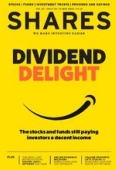Archived article
Please note that tax, investment, pension and ISA rules can change and the information and any views contained in this article may now be inaccurate.
The beginner’s guide to picking investment trusts

Investment trusts are a great way to get exposure to many different companies and/or bonds in a single product. Each one is run by a fund manager who makes all the investment decisions and there are more than 300 trusts available to UK investors, covering a wide range of sectors, geographies and themes.
Unlike traditional investment funds, investment trusts trade on a stock market which means their share price can change throughout the day. Trusts have other advantages over funds, including the presence of an independent board of directors who check the fund manager is doing what they are meant to.
Useful tools to help you find certain trusts
Your investment platform provider – namely the company with whom you hold your ISA or SIPP (self-invested personal pension) – should offer a screening service to help you narrow down the choice of investment trusts
You should be able to search by:
• Sector
•The company managing the trust
• Historical performance
• Cost
Some platforms might publish Morningstar fund ratings, so you can search by trusts with high or low scores
Funds issue new units when an investor deposits cash and they redeem units when an investor wants to sell, meaning there is a constant flow of money going in and out. In contrast, investment trusts have a fixed number of shares in issue; you buy stock from another investor and sell them back in the market, leaving the fund manager to focus purely on running the portfolio.
Unlike traditional funds, investment trusts are allowed to borrow money to hopefully boost returns from their portfolio by making more investments. That can also work against them when markets are falling. You can find information on the borrowing levels by looking for the ‘gearing’ figure which is widely published on investment trust factsheets and your investment platform provider’s website.
Investment trusts arguably provide better information to investors such as videos, articles and greater commentary in the media. This makes it easier to understand what’s going through the mind of the fund manager.
Popular investment trusts include F&C (FCIT) which invests in more than 450 individual companies from around the world; Scottish Mortgage (SMT) which backs growing companies that are, or have the potential to be, market leaders in their fields; Finsbury Growth & Income (FGT) which has stakes in high quality businesses; and City of London (CTY) which backs large multinational companies listed on the UK stock market.
WHAT TYPE OF TRUST WOULD YOU LIKE?
The Association of Investment Companies (AIC) has a lot of useful information on its website to help you pick investment trusts. For example, you specify whether you want your investments to grow, to generate income for you, or a bit of both. Tick the relevant box and it will show a list of relevant investment trusts.
On the AIC’s website you can also search by sector, such as companies in Asia Pacific or North America, businesses helping to protect the environment, property firms or tech stocks.
Investment trusts for income
Investment trusts have historically been popular with people who want to put their money into the markets to obtain an income. Trusts can hold back up to 15% of their annual income in a rainy day pot so they’ve got some extra money to hand to keep paying dividends during really difficult periods.
A lot of the highest yielding investment trusts will be invested in high risk areas of the market such as debt instruments. These can be too complicated for first-time investors to understand (and also experienced investors) so don’t be swayed by the promise of a juicy dividend if you don’t understand how this income is generated.
Sometimes it can be better to look for dividend growth rather than yield when selecting investment trusts for income, especially if you are intending to hold the product for a long time. The AIC publishes a list of ‘Dividend Heroes’ which it defines as trusts that have increased their dividend every single year for at least 20 years in a row.
Trusts with the longest record include City of London at 53 consecutive years of dividend growth, Bankers Investment Trust (BNKR) and Alliance Trust (ATST) also at 53 years, and Caledonia Investments (CLDN) at 52 years.
It will show you charges, dividend yield, how each trust has performed over different periods in the past, and whether you can buy it for more or less than the value of its underlying assets (called net asset value or NAV).
Because their share price is dictated by how much investors are willing to pay/receive to buy or sell respectively, investment trusts can trade at a premium or a discount to NAV.
Trusts with highly-respected fund managers can often trade at a premium because investors are happy to pay a bit extra to access their services. Infrastructure trusts have long traded above the value of their assets because investors are willing to pay a premium to access what are considered by many to be reliable dividends.
Smaller company and private equity-focused investment trusts tend to trade below the value of their underlying assets. That’s because the market believes it would be difficult for them to quickly sell everything should the trust be closed down.
Some investment trusts trade in line with value of their underlying assets because they have something called a discount control policy. This is a posh way of saying the trust will buy shares in the market and cancel them if they are trading for less than the value of its assets, or issue new shares if they are trading at a premium.
DISCLAIMER: The author owns shares in Scottish Mortgage
Important information:
These articles are provided by Shares magazine which is published by AJ Bell Media, a part of AJ Bell. Shares is not written by AJ Bell.
Shares is provided for your general information and use and is not a personal recommendation to invest. It is not intended to be relied upon by you in making or not making any investment decisions. The investments referred to in these articles will not be suitable for all investors. If in doubt please seek appropriate independent financial advice.
Investors acting on the information in these articles do so at their own risk and AJ Bell Media and its staff do not accept liability for losses suffered by investors as a result of their investment decisions.

 magazine
magazine









